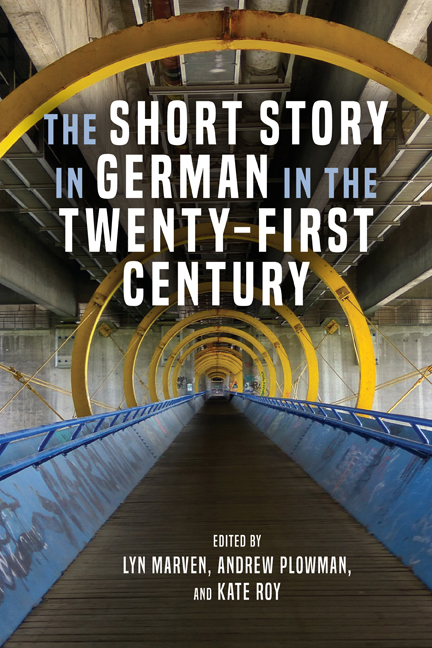Book contents
- Frontmatter
- Contents
- Acknowledgments
- Note on Translations
- Introduction to the Contemporary Short Story in German
- 1 Berlin Shorts: The German Capital in the Short Story of the Twenty-First Century
- 2 The German Crime Story in the Twenty-First Century
- 3 Performance, Performativity, and the Contemporary German Kurzgeschichte
- 4 Cramped Spaces, Creative Bottlenecks: Sudabeh Mohafez’s Das Zehn-Zeilen-Buch and the Short-Short
- 5 Bodo Kirchhoff’s Widerfahrnis: A Novelle for Our Time?
- 6 The Liminal Space of the Short Story: Clemens Meyer’s Die Nacht, die Lichter and Die stillen Trabanten
- 7 Framing the Presence: Judith Hermann’s Lettipark
- 8 Of Unhomed Subjects and Unsettled Voices: Alois Hotschnig’s Die Kinder Beruhigte Das Nicht
- 9 Authorial Development and Fluid Spaces in the “Complete Stories”: Peter Stamm’s Der Lauf Der Dinge
- 10 On Disappearing: Reading Ulrike Almut Sandig with Sylvia Bovenschen
- 11 Metamorphic Becomings: Yoko Tawada’s Opium Für Ovid: Ein Kopfkissenbuch Von 22 Frauen
- 12 Melinda Nadj Abonji and Jurczok 1001: Performance, Politics, and Poetry
- 13 Rhizomatic Wanderings: The Writings of Gabriele Petricek
- 14 Trends and Issues in the Contemporary German-Language Short Story
- Appendix: Contemporary German-Language Short Stories in Translation
- Bibliography of Primary Texts
- Notes on the Contributors
- Index
1 - Berlin Shorts: The German Capital in the Short Story of the Twenty-First Century
Published online by Cambridge University Press: 09 February 2021
- Frontmatter
- Contents
- Acknowledgments
- Note on Translations
- Introduction to the Contemporary Short Story in German
- 1 Berlin Shorts: The German Capital in the Short Story of the Twenty-First Century
- 2 The German Crime Story in the Twenty-First Century
- 3 Performance, Performativity, and the Contemporary German Kurzgeschichte
- 4 Cramped Spaces, Creative Bottlenecks: Sudabeh Mohafez’s Das Zehn-Zeilen-Buch and the Short-Short
- 5 Bodo Kirchhoff’s Widerfahrnis: A Novelle for Our Time?
- 6 The Liminal Space of the Short Story: Clemens Meyer’s Die Nacht, die Lichter and Die stillen Trabanten
- 7 Framing the Presence: Judith Hermann’s Lettipark
- 8 Of Unhomed Subjects and Unsettled Voices: Alois Hotschnig’s Die Kinder Beruhigte Das Nicht
- 9 Authorial Development and Fluid Spaces in the “Complete Stories”: Peter Stamm’s Der Lauf Der Dinge
- 10 On Disappearing: Reading Ulrike Almut Sandig with Sylvia Bovenschen
- 11 Metamorphic Becomings: Yoko Tawada’s Opium Für Ovid: Ein Kopfkissenbuch Von 22 Frauen
- 12 Melinda Nadj Abonji and Jurczok 1001: Performance, Politics, and Poetry
- 13 Rhizomatic Wanderings: The Writings of Gabriele Petricek
- 14 Trends and Issues in the Contemporary German-Language Short Story
- Appendix: Contemporary German-Language Short Stories in Translation
- Bibliography of Primary Texts
- Notes on the Contributors
- Index
Summary
THE BERLIN SHORT STORY is a generic oddity. The short story, certainly in its classical form, is concerned with plot and unusual events narrated in a realist style but much less so with place. The theme-based genre of city literature, on the other hand, has its primary focus on place and stylistic experimentation, often at the expense of plot and character. Yet it is also the case that the short story traditionally avoids a change of scenery, a generic feature that does allow for the use of place in a way that makes it central to the narrative. Furthermore, the short story defies exact definition, overlapping with, among others, the novel and the feuilleton, both of which play prominent roles in city literature. This chapter discusses the Berlin short story of the twenty-first century as a hybrid genre that blends the generic features of the short story with those of city literature. The resulting texts tend to recount out-of-the-ordinary situations in which Berlin is a recognizable setting and plays an important role within the story's narrative structure. Since both genres tend to be set in the present, the Berlin short story over time is thus a chronicle of the changing city.
Berlin literature, in the words of Andrew J. Webber, is about the “literary habitation” that is the city. The expression describes texts in which Berlin is central to the development of the plot and to the characters whose stories unfold within its confines, but it also refers to the home it provides for writers who reside there, and, finally, is an invitation to readers to enter into the literary space of the city. Berlin literature encompasses virtually all genres, including the drama, the feuilleton, and the poem, but most importantly, the novel. The most prominent example is still Alfred Döblin's 1929 Berlin Alexanderplatz, a work of high modernism in which the city—literally—speaks. The many Berlin novels of the 1990s, written under the spell of the drastic transformations in the wake of unification and supported by literary institutions and the publishing industry, tend to emulate Döblin's approach to the city, engaging with its physical features as plot elements in their own right.
- Type
- Chapter
- Information
- The Short Story in German in the Twenty-First Century , pp. 17 - 34Publisher: Boydell & BrewerPrint publication year: 2020



